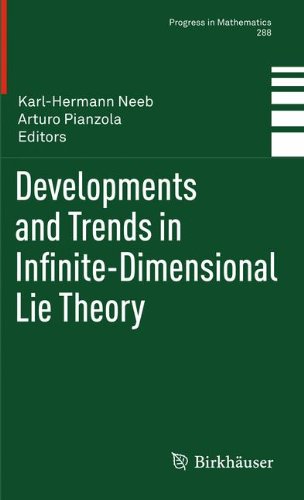

Most ebook files are in PDF format, so you can easily read them using various software such as Foxit Reader or directly on the Google Chrome browser.
Some ebook files are released by publishers in other formats such as .awz, .mobi, .epub, .fb2, etc. You may need to install specific software to read these formats on mobile/PC, such as Calibre.
Please read the tutorial at this link: https://ebookbell.com/faq
We offer FREE conversion to the popular formats you request; however, this may take some time. Therefore, right after payment, please email us, and we will try to provide the service as quickly as possible.
For some exceptional file formats or broken links (if any), please refrain from opening any disputes. Instead, email us first, and we will try to assist within a maximum of 6 hours.
EbookBell Team

4.1
70 reviewsThis collection of invited expository articles focuses on recent developments and trends in infinite-dimensional Lie theory, which has become one of the core areas of modern mathematics. The book is divided into three parts: infinite-dimensional Lie (super-)algebras, geometry of infinite-dimensional Lie (transformation) groups, and representation theory of infinite-dimensional Lie groups.
Part (A) is mainly concerned with the structure and representation theory of infinite-dimensional Lie algebras and contains articles on the structure of direct-limit Lie algebras, extended affine Lie algebras and loop algebras, as well as representations of loop algebras and Kac–Moody superalgebras.
The articles in Part (B) examine connections between infinite-dimensional Lie theory and geometry. The topics range from infinite-dimensional groups acting on fiber bundles, corresponding characteristic classes and gerbes, to Jordan-theoretic geometries and new results on direct-limit groups.
The analytic representation theory of infinite-dimensional Lie groups is still very much underdeveloped. The articles in Part (C) develop new, promising methods based on heat kernels, multiplicity freeness, Banach–Lie–Poisson spaces, and infinite-dimensional generalizations of reductive Lie groups.
Contributors: B. Allison, D. Beltiţă, W. Bertram, J. Faulkner, Ph. Gille, H. Glöckner, K.-H. Neeb, E. Neher, I. Penkov, A. Pianzola, D. Pickrell, T.S. Ratiu, N.R. Scheithauer, C. Schweigert, V. Serganova, K. Styrkas, K. Waldorf, and J.A. Wolf.